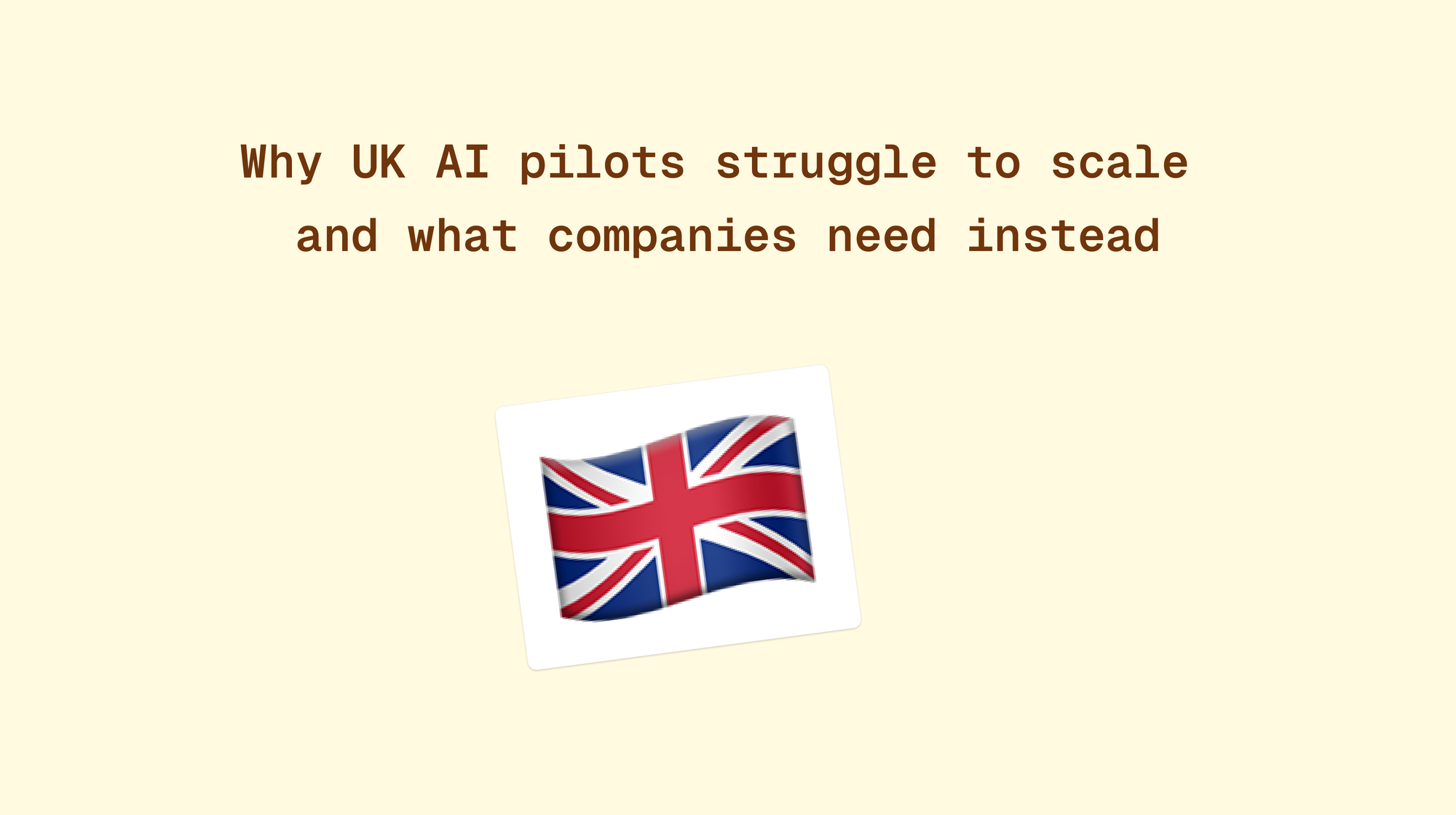Why UK AI pilots struggle to scale and what companies need instead

Hi, I'm Sophie. I work at Dust to help expand it in the UK. I spent 8 years in London - from university through my early career - and the city's tech scene has always felt like home to me. After hosting 90 builders in Shoreditch last week, I'm more convinced than ever that London is ready for a powerful agentic platform, and I want to share what I'm learning as I build in public.
→ Why UK companies are stuck between pilots and production
→ The architecture insight: systems of agents vs one mega-agent
→ Where Dust fits in the UK's AI investment boom
→ What agent-building actually looks like in practice
This month, we hosted our first ever "Build Your First Agent" night in Shoreditch. Over 90 people crammed around laptops to build anything they could think of on Dust, many having never touched an agentic tool before.
When we circled the room, one man who runs a non-alcoholic drinks company was stuck. He'd tried to build one agent to do everything: find leads, email them, follow up, qualify them, and hand them off to his sales team.
It wasn't working. The agent was confused, slow, contradicting itself.
We recommended he build a system of agents instead: one to research, one to personalise outreach, one to track responses, one to qualify. Specialised agents that could hand off to each other.
Here's why that works: each agent has clear context boundaries. When one agent does everything, the prompt becomes a 10-page instruction manual. When you split into specialised agents, each has a focused job with clear inputs and outputs. Less confusion, better results.
By the end of the night, we had multiple people presenting their agentic systems: excited and surprised to see their visions come to life. The breakthrough happened when they stopped thinking "one big agent" and started seeing it as building blocks working together.
The tension in UK AI investment
Here's the tension: UK AI startups raised £2.9bn in 2024, representing 30% of all European venture capital investment. The government forecasts AI could unlock £47bn in annual productivity gains.
But almost all of that investment went to infrastructure and customer-facing AI—to the tech that powers AI products. Far less goes to the operational layer: helping teams collaborate and work better day-to-day.
At every event we host, we ask operators: "How are you using AI?" They light up talking about their product roadmap—how they're building AI into what they sell. But when I ask how they work? How their teams collaborate? Usually, we get some version of "We're still figuring that out."
The problem no one's naming
The UK has a productivity gap. It's been widening for two decades vs. the US and Europe. Not because UK workers aren't talented—they absolutely are.
Part of what drives that gap is how much time UK knowledge workers spend on coordination vs creation. Part of it is what our CEO Gabriel calls "working in silos instead of at the seams."
As Gabriel writes: "We all know the effort required to understand or communicate in another team's 'language.' Marketing deciphering tech documentation, sales formalising client feedback for product teams, engineers sifting through design memos."
These handoffs, between sales and customer success, marketing and ops, support and product, aren't glamorous. But they're where time vanishes and context gets lost. Where good work dies in friction and translation.
Here's a concrete example: when a sales deal closes, they hand off to customer success. Typically, CS gets a Slack message, a Notion doc, and a half-remembered conversation. An agent sitting at that handoff point can automatically compile the deal context, flag custom terms, and prep the CS team, before the kickoff call even happens.
We see that as the real opportunity. Not just making individuals 10x faster, but fixing the friction between teams.
What I'm learning at UK events
Three patterns keep showing up:
1. The "How is this different from Zapier?" question
People default to thinking about workflows. Zapier connects apps and executes steps. That's valuable. But agents do something different: they understand context, make decisions, and operate between teams.
As Gabriel puts it: "Magic happens when you build agents that operate between departments. Sales-to-onboarding handoff agents. Contract renewal anomaly detectors that work between finance, legal and sales... These agents don't belong to any one team, which is one of the reasons they can provide powerful results: they solve the coordination problems that slow down every company."
We're building support systems that sit between people and teams.
2. The architecture gap
At Monday's event, almost everyone wanted to build one agent to do everything. When we reframed it—from one huge agent to a system of agents—breakthroughs happened. People were excited to see their vision come to life, spending about the same amount of time creating multiple functional agents as they would have spent creating one master prompt for a huge agent. And typically, this gives them way better results.
Think of it like Lego blocks. You could try to build your entire structure from one massive, complicated piece. Or you could build it from smaller, specialized blocks that snap together. Each block is simple and does one thing well. But together, they create something sophisticated and flexible—and if one piece needs changing, you don't have to rebuild everything.
That's what makes agent systems powerful: Dust doesn't just analyse and query information. Agents can act on your behalf, compute sophisticated outputs, and coordinate across your entire company's knowledge base. This means you're not just getting smarter search—you're getting an operating system that can actually do work for you.
3. The silent majority
Most UK companies are still in discovery mode. They've tried ChatGPT or Copilot. They've heard about agents. But they haven't deployed anything company-wide. They're waiting for proof and reliability.
What this looks like in practice
I use Dust agents myself:
- One monitors the UK tech ecosystem and feeds new leads into the sales team weekly
- One helps me prioritise my daily tasks against my quarterly goals
- One identifies speaking opportunities where Dust should have a presence
I'm already seeing how agents can amplify impact, not by working faster, but by handling the coordination and desk work that used to eat my day.
The same goes for our customers: Mirakl, a 700-person European marketplace platform, went from 55% to 91% AI adoption in 30 days. At Mirakl, 30% of employees now build agents—not because they're engineers, but because Dust makes it accessible. Product managers automate competitor analysis. Customer success teams build onboarding checklists. Sales ops creates territory planning agents. This isn't IT driving adoption top-down; it's teams solving their own problems.
These aren't sexy use cases. But they're real, and have concrete impact on the business as a whole.
Where Dust fits
That's where Dust fits. We connect to your company's actual data—Slack, Notion, GitHub, whatever you use—and let any team build agents that work for them. No waiting on an admin. No reliance on the tech team, or separate tool for each department.
The UK is investing £2.9bn in AI. Government is forecasting £47bn in productivity gains. The ecosystem is buzzing.
But there's a gap: between the infrastructure being built and helping people actually work better.
Dust sits in that gap. We're helping UK companies build agents that work at the intersection of teams—between Sales and Onboarding, Marketing and Ops, Support and Product. The coordination points that slow everyone down.
Companies like ContentSquare, Semble, and Birdie are already using Dust in the UK. Their teams are seeing it: agents that understand company context, handle the coordination work, and free people up to focus on what matters.
We're building systems that work. And I'm excited to keep showing the UK what's possible—one event, one breakthrough moment, one agent at a time.
Ready to build your first agent?
→ Try Dust free
→ Join our our next London events
→ Follow us on LinkedIn and X (@DustHQ) for UK events + agent-building tips
I'm building Dust's UK presence in public. If you're working on AI adoption at your company, I'd love to hear what you're seeing—DM me on LinkedIn or email me.

